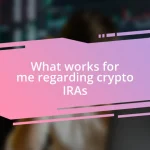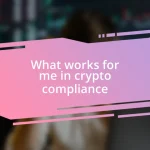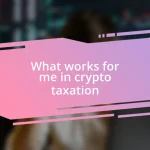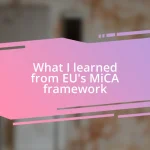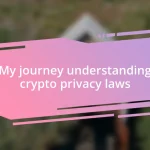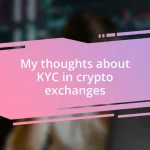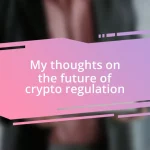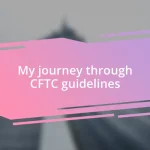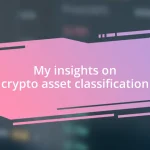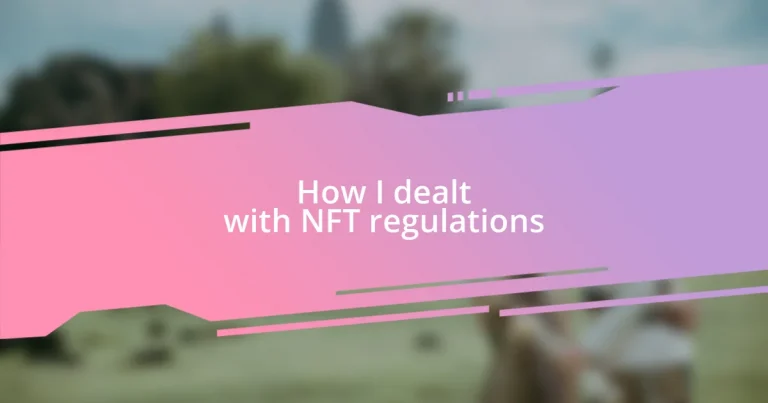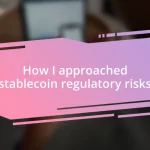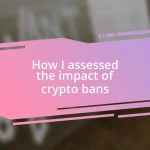Key takeaways:
- Understanding NFT regulations requires awareness of ownership rights, copyright issues, and local laws to avoid legal pitfalls.
- Engaging with regulatory bodies like the SEC and FTC is crucial for structuring compliant NFT projects, ensuring transparency and consumer protection.
- Developing a proactive compliance strategy involves continuous education, expert consultations, and community engagement to stay ahead of regulatory changes.
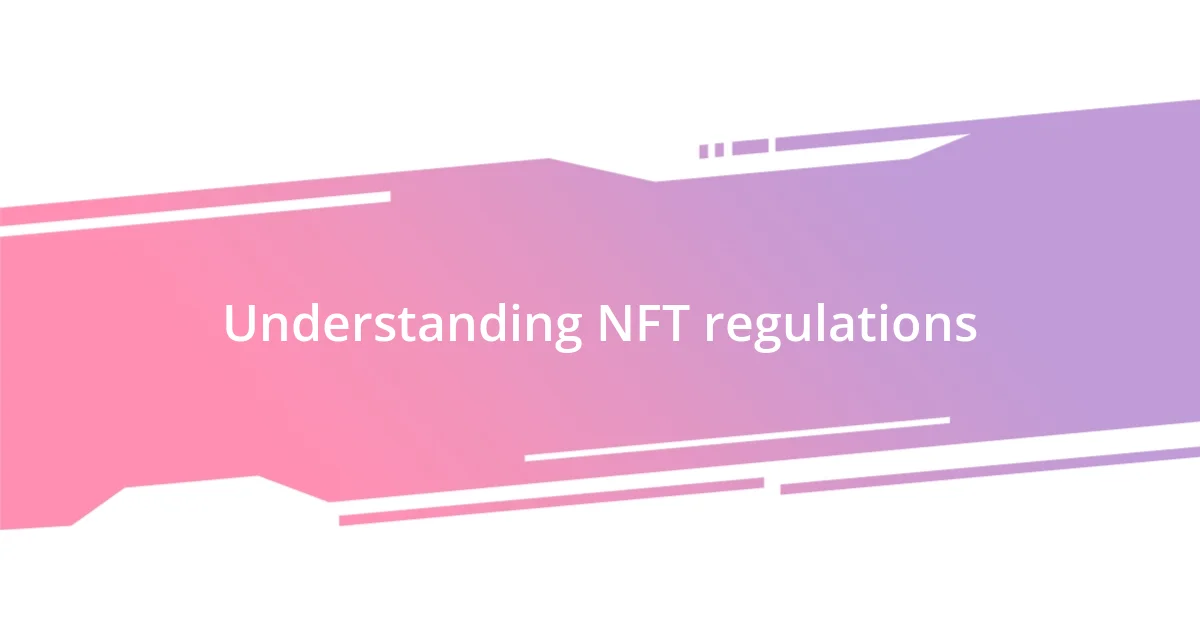
Understanding NFT regulations
NFT regulations are an evolving landscape, and understanding them can feel daunting. When I first dipped my toes into the NFT market, I had this overwhelming feeling of confusion about what was considered legal and ethical. Have you ever felt that way when navigating new territory? It was during those early days that I learned how essential it is to stay updated on the various regulations, especially concerning intellectual property and consumer protection.
As I explored the implications of ownership and copyright in the NFT space, I encountered a few eye-opening moments. I vividly remember a situation where a piece I was interested in was suddenly taken down due to copyright claims. This taught me the importance of verifying the creator’s rights before buying. It really hit me how crucial it is to understand the legalities before entering any transaction in the NFT world; not doing so could lead to unexpected pitfalls.
Moreover, I found that regulations vary significantly between countries, which added another layer of complexity. Did you know that some jurisdictions are more accommodating toward NFTs than others? During my research, I discovered that what might be permissible in one country could be entirely off-limits in another. This realization drove home the point that anyone entering this space should familiarize themselves with local laws to avoid potential legal entanglements.
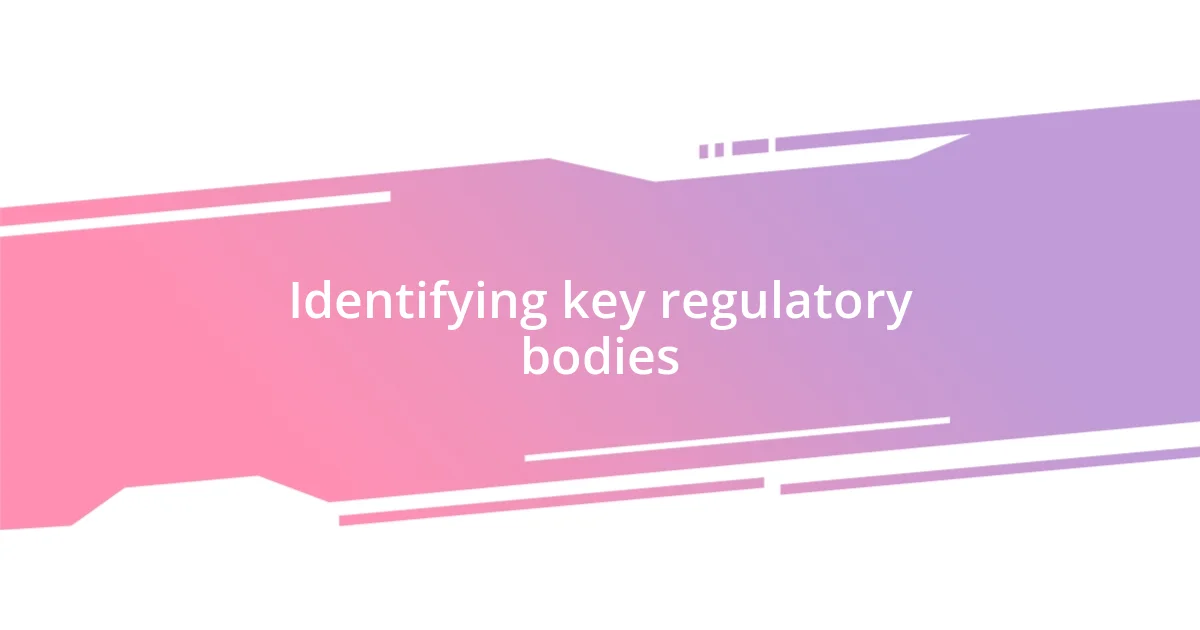
Identifying key regulatory bodies
Navigating the world of NFT regulations requires a keen understanding of the various regulatory bodies involved. In my journey, I came across a handful of key organizations that play significant roles in overseeing NFT activity. They can be quite influential and, at times, intimidating if you’re not familiar with their functions. The first time I stumbled upon the Securities and Exchange Commission (SEC), I felt a mix of curiosity and anxiety. I realized just how careful I needed to be when structuring projects that could potentially be seen as securities under U.S. law.
Here are some of the primary regulatory bodies to keep an eye on:
- Securities and Exchange Commission (SEC): Oversees securities regulations and can impact NFTs viewed as investment contracts.
- Commodity Futures Trading Commission (CFTC): Regulates commodity and futures markets, potentially relevant for NFT trading platforms.
- Financial Crimes Enforcement Network (FinCEN): Monitors financial transactions to prevent money laundering and fraud in cryptocurrency-related activities.
- International Organization of Securities Commissions (IOSCO): Provides global standards and guidelines for securities transactions, impacting cross-border NFT transactions.
- Copyright Office: Enforces intellectual property laws, critical for understanding rights related to NFT content.
Encountering the Federal Trade Commission (FTC) was another pivotal moment. Their guidelines on advertising and consumer protection left me more aware of how crucial it is to provide transparent information to potential buyers. I remember reflecting on a project I was developing, realizing that ethical practices not only protect users but also enhance credibility in a saturated market. Understanding these regulatory bodies has been invaluable in shaping my approach to NFT projects, making me feel more secure in navigating the complexities of this space.
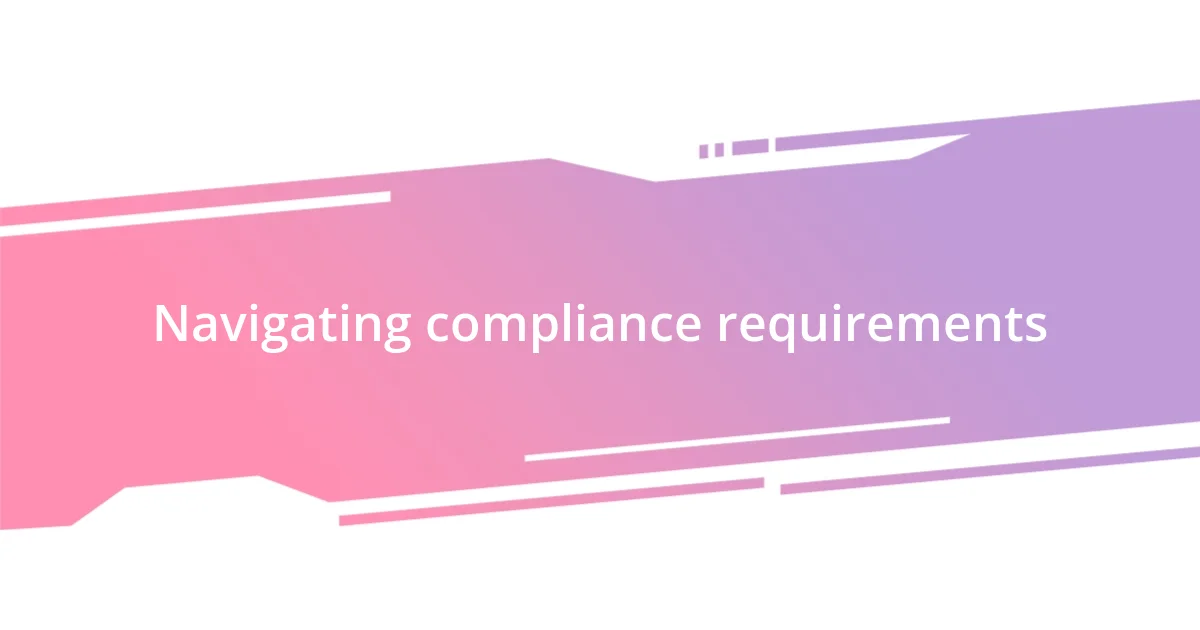
Navigating compliance requirements
Navigating compliance requirements in the NFT space can often feel like walking a tightrope. I remember a time when I was preparing to launch an NFT collection, and I realized that regulatory compliance wasn’t just a checkbox to tick off. It was about crafting a solid foundation for the project. I found myself knee-deep in legal documents, terms of service, and guidelines, all while trying to keep the creative spark alive. That balance was challenging but essential in establishing trust with potential buyers.
I learned that staying compliant requires a proactive approach. For instance, I set up regular check-ins with a legal advisor who specializes in digital assets. This relationship allowed me to stay ahead of any regulatory changes while sharing ideas on compliance strategies. Going this extra mile not only gave me peace of mind but also fostered a sense of responsibility to the community I was building. I believe that transparency in compliance efforts resonates with users, creating a more robust marketplace for everyone involved.
It’s crucial to note that compliance isn’t a one-time effort. As NFT regulations evolve, I’ve found that continuous education is essential to navigate these waters effectively. For example, I made it a habit to attend webinars and engage with industry discussions. This ongoing commitment helps keep my knowledge fresh, making me feel more empowered and connected to the ever-changing landscape.
| Compliance Aspect | My Approach |
|---|---|
| Understanding Legal Requirements | Thorough research and continuous update on regulations |
| Regular Consultations with Experts | Scheduled meetings with legal advisors |
| Community Engagement | Participating in webinars and discussions |
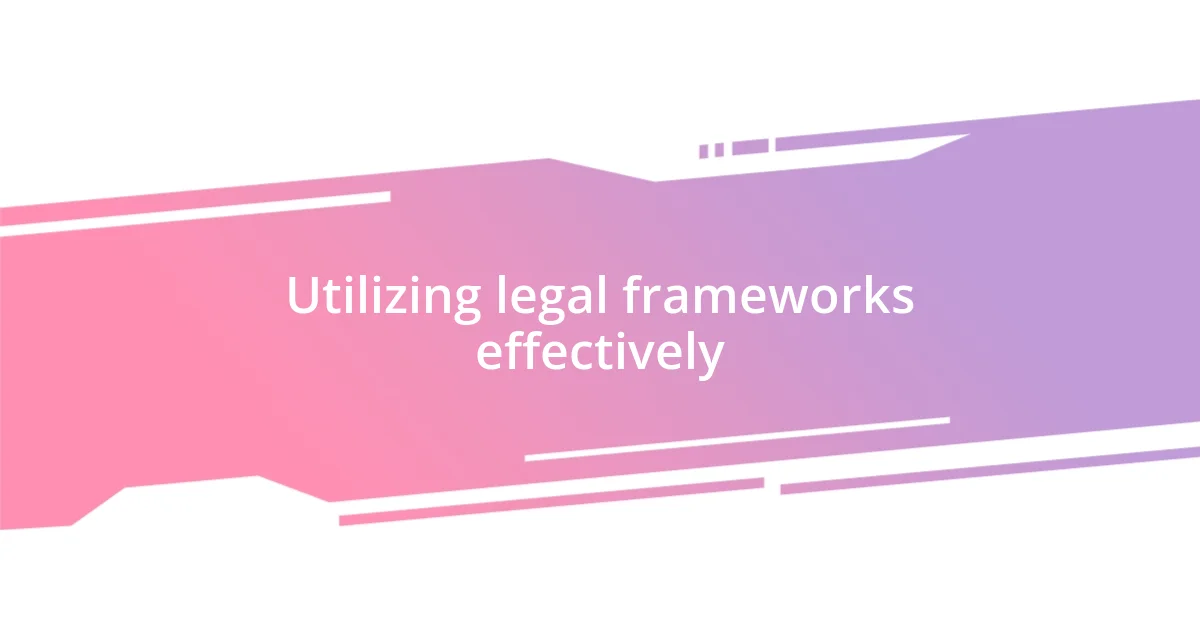
Utilizing legal frameworks effectively
Understanding and utilizing legal frameworks effectively in the NFT space has been instrumental in my journey. I recall one instance where I was developing an NFT project that had the potential to intersect with copyright laws. Instead of rushing ahead, I took the time to consult with an intellectual property attorney. That conversation opened my eyes to the nuances of licensing and ownership rights, which ultimately saved me from potential legal pitfalls.
Another experience that stands out is when I realized that the lack of regulatory clarity could be a double-edged sword. During the early stages of my NFT venture, I found myself constantly questioning whether I was doing enough to comply with existing laws. Engaging with a community of creators and legal experts provided me a support system that clarified my understanding of the legal landscape. Have you ever felt overwhelmed by the myriad of regulations and wonder if your efforts are truly enough? Trust me, you’re not alone in this.
I also learned the importance of building compliance into the project from the start. My first attempt involved a last-minute scramble to align my project with SEC guidelines. It was a stressful period that taught me a valuable lesson: integrating legal considerations early in the planning process fosters a smoother path ahead. Adopting a proactive mindset toward regulatory frameworks not only shields you from future complications but also instills confidence in your audience. Knowing that your project is grounded in legality allows for genuine creativity to shine through, wouldn’t you agree?
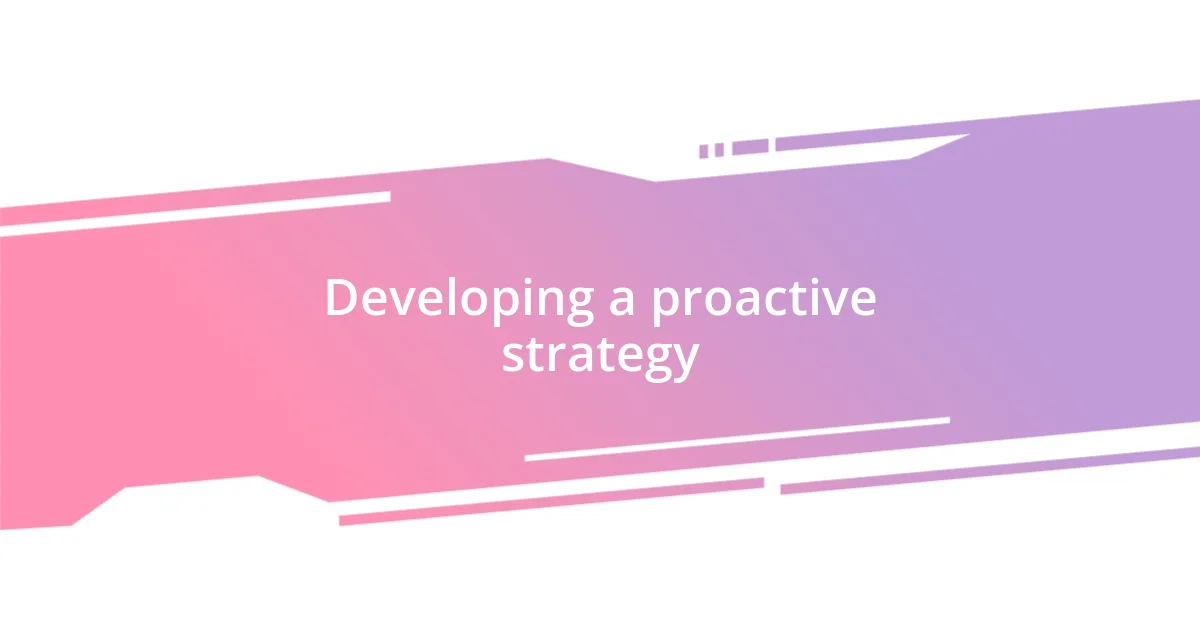
Developing a proactive strategy
Developing a proactive strategy in the NFT space is not just about staying compliant; it’s about anticipating changes before they impact your project. I remember a point in my journey where I felt overwhelmed by the ever-shifting regulatory landscape. It was then that I started mapping out a strategy that centered around regular updates and proactive engagement. This shift allowed me to view compliance as an ongoing dialogue rather than a one-time task, transforming stress into empowerment.
I discovered that building a network of knowledgeable industry peers was incredibly beneficial. By forming connections with fellow creators and compliance experts, I tapped into a wealth of insights that kept me informed about emerging trends and potential regulatory shifts. Have you ever had that moment when a conversation sparks your creativity, just when you need it most? That’s what these discussions felt like for me—fuel for innovation woven together with a safety net of community support. It encouraged me to embrace a mindset of collaboration, where sharing knowledge became a cornerstone of my approach.
From my experience, I found value in drafting a compliance checklist tailored specifically to the nuances of my projects. I remember painstakingly outlining every applicable regulation, and it felt tedious at times, but this meticulous process was a game changer. It turned compliance from a vague concept into tangible steps I could follow. Looking back, I realized this proactive strategy didn’t just safeguard my projects; it instilled a sense of confidence that resonated with my audience. When they saw that I took regulatory matters seriously, it bolstered their trust, which is invaluable in this digital marketplace. Have you considered what such a strategy could mean for your own projects?
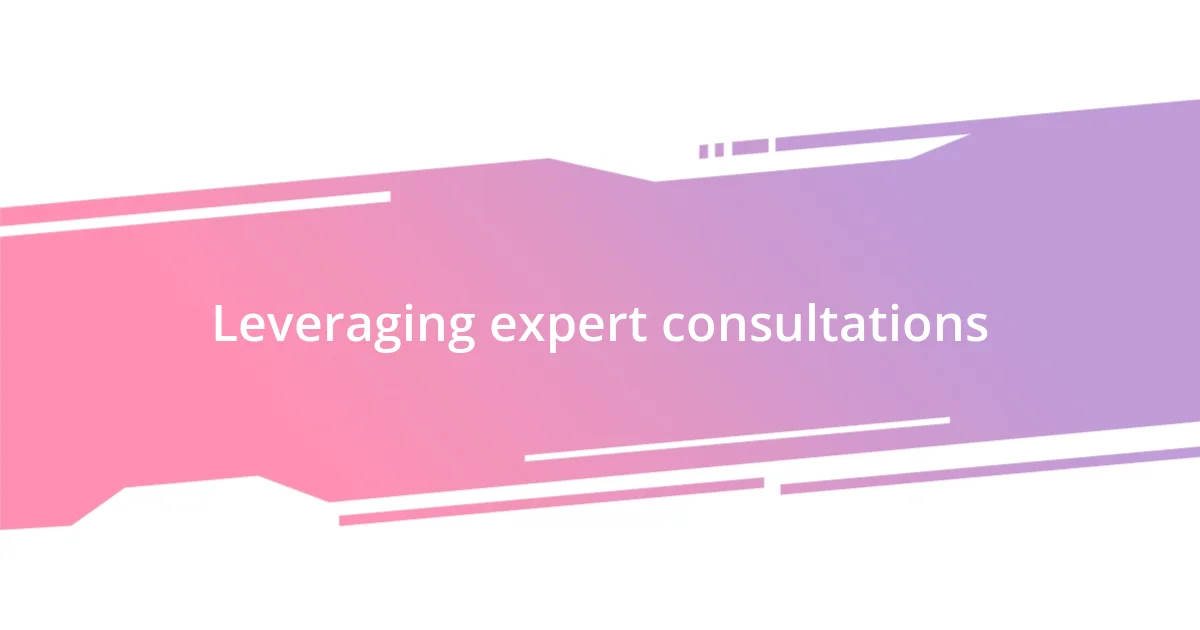
Leveraging expert consultations
Engaging experts early on proved to be a game changer for me. I remember attending a blockchain conference where I had the chance to speak with a regulatory specialist. Their insights helped me identify potential compliance issues I had overlooked, making me realize how valuable these expert consultations can be. Have you ever left a conversation feeling like you just uncovered a hidden treasure of knowledge? That was definitely my experience.
On another occasion, I reached out to a consultant specializing in NFT taxation. Their thorough breakdown of tax obligations transformed my perspective completely. I learned about specific regulations that could affect my revenue and how to structure my sales for optimal compliance. It felt liberating to have that clarity; I could finally focus on creating rather than worrying about potential missteps. How much more productive could you be if you had a clearer roadmap?
I also made it a habit to follow up with these experts periodically. One of my best decisions was scheduling regular check-ins with my legal advisor, providing ongoing insights as the regulations evolved. This proactive approach turned my compliance journey into a partnership, where I continuously learned how to adapt my projects while adhering to the latest standards. Have you considered how often you connect with your experts? Keeping that line of communication open could unlock new opportunities for you, just as it has for me.
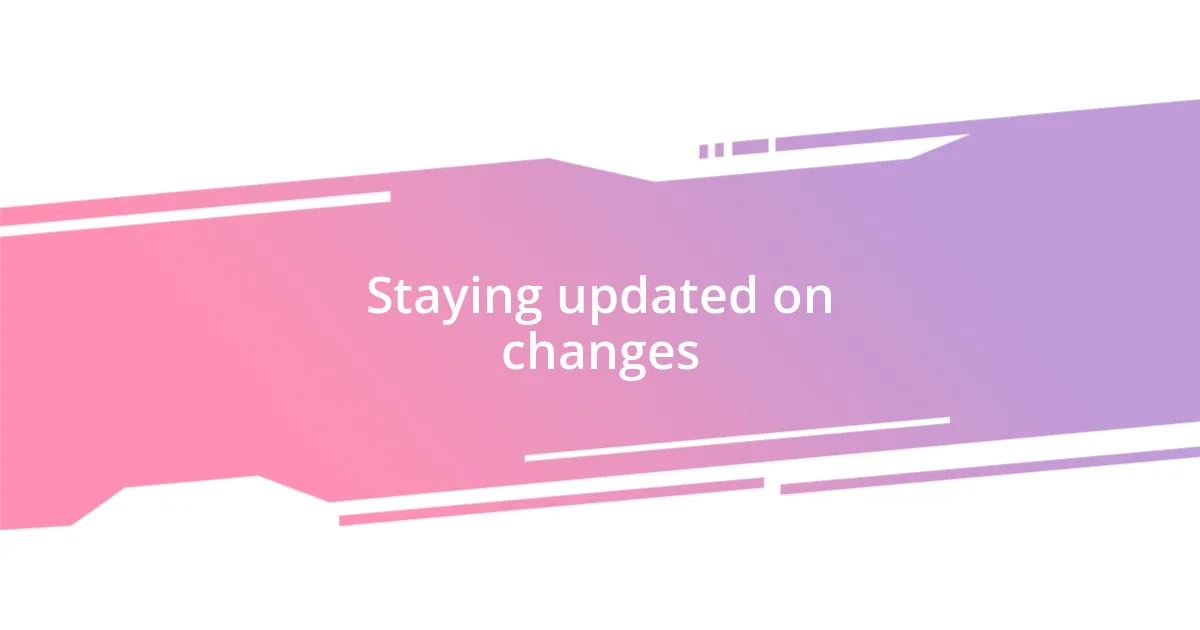
Staying updated on changes
Staying updated on regulatory changes in the NFT space has been crucial for me. I remember a particular week when a major update reshaped the landscape, and I felt that familiar flutter of anxiety in my stomach. However, I had subscribed to several industry newsletters and joined online forums, which transformed that anxiety into informed anticipation. Keeping my inbox filled with insights helped me feel like I was always a step ahead, rather than scrambling to catch up.
One of the most beneficial methods I adopted was setting aside time each week to review relevant news and updates. I often found myself deep in articles during my coffee breaks, not only absorbing information but also reflecting on how it applied to my work. This weekly ritual became a grounding point for me, turning the overwhelming vastness of regulations into manageable segments. Have you thought about dedicating a specific time in your week for this purpose? It can truly shift your perspective from chaotic to organized.
Moreover, I sought out social media groups that focused on NFTs and legislative changes. Engaging in discussions with fellow enthusiasts was an eye-opener; the diverse opinions and shared experiences acted like a safety net, reminding me I wasn’t alone in navigating this complex environment. One discussion about upcoming compliance changes led to a project pivot I hadn’t considered before, sparking a wave of creativity. Isn’t it fascinating how shared knowledge can inspire new directions? My journey taught me the importance of both staying informed and actively participating in conversations within our community.
